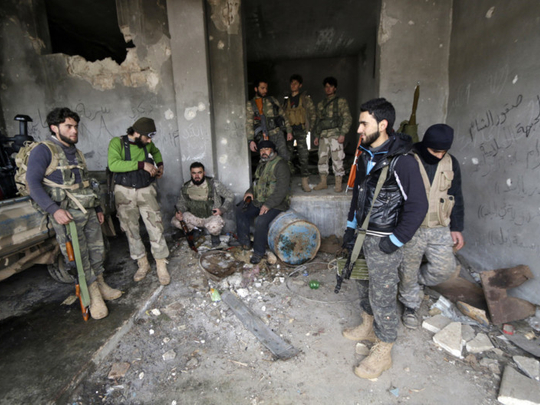
In the wake of the Paris attacks by religious extremists on the satirical magazine Charlie Hebdo, discussions resurfaced in the mainstream media about the significance and dangers that such extremists pose to their countries of origin. It has been well-documented that several individuals from European countries as well as numerous Arab states have been flocking to Syria and Iraq. The exact numbers are hard to verify since no comprehensive database exists.
It needs to be stated that the perpetrators of the Charlie Hebdo attacks were not returning terrorists in the common sense of the word. That is, they did not spend time in the conflict zones of Iraq or Syria, then returning to France to unleash their violent energies.
What is known, however, is that they did receive weapons training in the Yemeni desert, an Al Qaida stronghold. Not too long after the attacks, Al Qaida in the Arabian Peninsula (AQAP) claimed responsibility for the attacks, notwithstanding the fact that one of the assailants, Amedy Coulibaly, had pledged allegiance to Daesh (the Islamic State of Iraq and the Levant), not AQAP. This can be interpreted as a turf war that has been ongoing for some time now between various competing groups in the terrorist camp.
Regardless of the exact affiliation of the French terrorists behind the Charlie Hebdo attacks, many analysts and media outlets are restating the claim that foreign terrorists are the most serious threat to their countries of origin. While this narrative makes common sense, one should be cautious in taking it at face value. The generally perpetuated narrative rests on the following (and feasible) assumption: A still undetermined and potentially large number of young Muslims from both the Muslim majority states of the Middle East, North Africa and Central Asia, and also from European states, are drawn to join the fighting in Syria and Iraq due to several underlying circumstances.
For one, they are drawn to the said war due to religious conviction, while fighting a perceived western invader and existing Arab oppressor. Syria, though, offers another motivational element, namely sectarianism. Many ideologues have framed the war in Syria and Iraq as sectarian cosmic battles, in which one sect needs to be protected from the other. This is definitely a pull factor for many potential terrorists. A cautionary note: It is problematic to ascertain what the actual intentions of the suspects are, aside from short and media-filtered biographical information available.
Foreign fighters, during their extended stay, gather valuable training and fighting experience, which make them extremely dangerous once they return to their country of origin as hardened veterans. Once back home, now even more radicalised by their experience abroad, these individuals may vent their aggression against their home country by plotting attacks and committing atrocities against perceived enemies. Such attacks may be pre-planned, coordinated with Daesh or AQAP leaders or a result of small independent radicalised terrorist cells in Europe.
Mere sense of excitement
That said, the evidence gathered by some recent studies on foreign fighters paints a slightly different picture than the above scenario. For one, instructions that are part of the training regiment abroad are very rarely the type required for attacks back home. Often recruits receive only basic paramilitary training and are often exploited by radical groups in the Middle East in terms of manpower and funding. They by no means receive any substantial training that would make them potent, ingenious fighting machines back home. One major study suggests that a large number are driven by a mere sense of excitement, rather than religious or political convictions, and adventurism and that most of the men are young and ideologically uninformed.
Daesh has also established a reputation that it is brutal yet successful in its surge as well as a better financial provider compared to some of the other militant groups. Religious conviction is secondary, being a member of the winning side is more of a draw. The ease of travel is seemingly another facilitating factor. It is fairly easy to travel to Turkey and then cross the various porous border crossings with or without the help of Daesh militants via social media outlets.
While the potential of foreign fighters morphing into terrorists once they return home from their stint in Syria and Iraq is justified, it is also likely overblown. The aforementioned study by the Brookings Institution, a US think tank, has found that foreign fighters do not always end up attacking their home country in the West upon return from the Middle East training camps or battlefields. There are a number of reasons as to why that is the case. For one, many of the foreign fighters end up dying in suicide attacks or in firefights with opposing forces, very often in combat with other competing terrorist groups. Others decide not to return home, but stay on to fight elsewhere or because they are fearful of being detained and prosecuted upon their return by respective security forces and courts. The actual role of security forces is instrumental and not to be understated. In a large number of cases, intelligence services have tracked, monitored and arrested returnees especially since many of the extremists had exposed themselves via the internet, making it easy for security forces to gather valuable information.
Last but not the least: Those that manage to return back to their home country are often disillusioned and traumatised by what they had experienced and may, according to the authors of one report, even lead a relatively normal life.
Credit: Kristian P. Alexander is assistant professor in the College of Sustainability Sciences and Humanities, Zayed University, Abu Dhabi.











